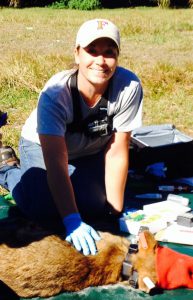By: Bethany Wight, Biologist
UF/IFAS Range Cattle Research and Education Center

Jaime Eduardo Garzón Alfonso was born and raised in Bogotá, the capital city of Colombia located 8,530 feet above sea level. Growing up, his parents instilled the importance of school and helping in the house. During elementary and high school, Colombia teaches a broad area of subjects in order to allow students to explore their interests and prepare for studying at a university. Jaime liked biology and biochemistry, and helping on his grandfather’s ranch on vacations.
Jaime attended the Universidad Nacional de Colombia (UN) in Bogotá and graduated in 2011 as a zootechnician, similar to a bachelor’s of animal science in the US.
“While earning my zootechnician degree, I was exposed to many different subjects. At first, I thought I wanted to get into animal reproduction, but after my first reproduction class I quickly realized it was not for me and changed interests into grasslands.”

Jaime continued his education at UN and earned a master’s degree in animal production in 2018. His master’s research involved traveling to the Instituto Nacional de Investigación Agropecuaria in Uruguay and working with Dr. Verónica Ciganda on the measurement of greenhouse gases in pastures. There, he learned the closed static chambers methodology to measure nitrous oxide (N2O) fluxes. Then he returned to Colombia to teach and apply this technique. While completing his master’s degree, Jaime worked in the improvement career plan program, where he helped by interviewing professors and students and uploading new information to advance the national platform. He also worked in the curricular program by assisting the Zootechnics study plan update. Throughout his degree, he also taught an introductory class of grasslands and soil at UN.
“I really enjoyed teaching as it allowed me to gain perspective on both sides, being a student and a professor. It helped me understand the learning process and often I learned from my students.”
While preparing to defend and present his Master’s research, Jaime got an internship at the North Florida Research and Education Center in Mariana, FL, working with the Dr. Nicolas DiLorenzo in the animal science research group for six months in 2017-2018. There, he was able to familiarize himself with the US and further solidify his interests in grasslands.
“While I was studying for a master’s degree, my professors at UN advised me to continue in a research career. It had never crossed my mind to earn a PhD, but I realized it was an attractive option.”
Jaime was considering taking a job in Colombia after he finished his Master’s degree; however, he applied and was awarded a Fulbright scholarship, which would partially fund his PhD program in the USA.
“I was not selected for the job, but I finally got the scholarship, so it seemed that life was guiding me to the United States.”

Working with his previous professors and advisers, Jaime came in contact with Dr. Joao Vendramini and began his PhD in the RCREC’s agronomy program in May of 2019. As part of his commitment to the Fulbright scholarship, Jaime’s dissertation project must be related to something that can be linked with his country.
Dr. Vendramini and Jaime decided to evaluate some of the ecosystem services two legumes [Joint vetch (Aeschynomene americana) and sunn hemp (Crotalaria juncea)] can provide to grasslands, as these plants are already available in Colombia. Jaime’s research involves evaluating forage nutritional value by measuring nitrogen concentration and digestibility, herbage accumulation by measuring biomass, decomposition of organic matter using soil decomposition bags, nitrous oxide emissions using static closed chambers, biological nitrogen fixation using an isotope technique, and microbial populations using qPCR. Jaime plans to defend his PhD dissertation in the spring or summer of 2022.

Jaime considers himself a bit of an introvert. His favorite hobbies are reading and watching movies, especially Disney. However, he also enjoys bike riding, swimming and going outside with friends. His favorite thing about living and working at the RCREC is the balance between the rural environment and city commodities, besides also saving money. Being in the US, especially at the center or university, has also allowed him to learn about many different cultures. One of the commitments with his scholarship is that once complete he must return to Colombia for at least two years.
“I hope to find a good job and continue my personal and professional life in Colombia. I want to support the research in the Colombian agricultural sector, since my country has a lot of potential. I would like to work at a research center, such as CIAT (International Center for Tropical Agriculture) or Agrosavia (Colombian Agricultural Research Corporation) or at a university conducting research while teaching. After those two years ‘el tiempo dirá’ (time will tell).”

This was written by Bethany Wight, a biological scientist at the UF/IFAS Range Cattle REC in Ona, FL. If you have questions please contact her at bwight@ufl.edu.
For more information on the UF/IFAS Range Cattle REC Agronomy Program, visit:
https://rcrec-ona.ifas.ufl.edu/forage-agronomy/
 0
0

Comments:
May 8, 2020
wonderful, what a great person !!!!
Comments are closed.